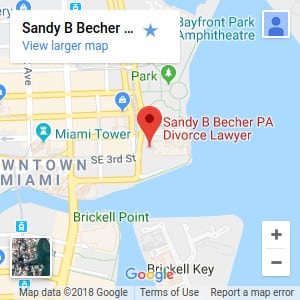It is natural for children to develop a closer relationship with one parent than the other. This might be the parent with whom they spend more time, or it might be the one who imposes discipline in a gentler way.

It is also natural for parents to stress over the pending custody arrangement during divorce proceedings. Although you probably believe that children should typically maintain a relationship with both parents, you may also believe that you are a better caregiver than your spouse and that your children would prefer to live with you.
If you are facing a contentious custody battle, you may be wondering just how much say your children will have in the custody arrangement. To discuss your situation with a child custody attorney in Miami, turn to Sandy B Becher PA.
Mr. Becher can help you avoid making costly mistakes that might compromise your personal or financial interests. Call 305-860-5811 to schedule a consultation.
Will My Child’s Preferences Affect the Custody Case?
In general, children cannot decide which parent they want to live with until they are 18 years old; however, in most cases, a family law judge will take their preferences into account. According to the American Bar Association, the court will determine just how much weight to give a child’s preferences based on a variety of factors.
First, the court will consider the child’s age and maturity. A family judge will give more weight to older children’s preferences.
The court will also consider the child’s reasoning for preferring one parent over the other. If the child claims the parent of choice provides more freedom, the court will not place much weight in his or her preference. Likewise, the court will not place much stock in a particular preference if the child’s reasons seem coached or vague.
Will My Child Have to Testify at the Custody Hearing?
In general, judges do not like having children testify at custody hearings. Family courts ultimately want to protect children from the drama that often surrounds divorce litigation.
As a result, the courts have several other ways to evaluate a child’s preferences regarding custody. For example, the court might appoint a mental health professional to interview the child. The licensed professional can then testify on the child’s behalf regarding his or her wishes.
In some cases, the court may appoint a guardian ad litem to represent the child’s best interests during the custody hearing. This guardian will talk to the child about any preferences and then share them with the court during a later testimony.
Still in other cases, the judge may actually talk to the child without the parents. As long as a court reporter is present to record the child’s statements, the judge can use this conversation when determining a custody arrangement.
If you are facing a custody battle in the state of Florida and you want to do everything in your power to secure a favorable arrangement, turn to Sandy B Becher PA. Mr. Becher has been practicing law for more than two decades.
Call 305-860-5811 to schedule a case evaluation with a child custody lawyer in Miami. You can learn more about custody laws in Florida by visiting USAttorneys.com.





